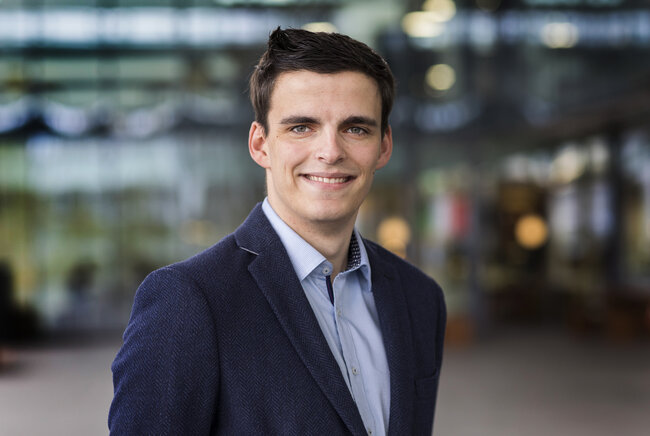Exploring Reactive Extrusion of Dynamic Covalent Networks
Jeroen van Aart successfully defended his thesis at the department of Chemical Engineering and Chemistry on July 6th.

The development and optimization of dynamic covalent networks (DCNs), a class of materials with the potential to revolutionize sustainable applications such as reusable adhesives, 3D printing, composite manufacturing, and recycling was the focus of Professor Jaap den Doelders first project at TU/e. The research, generously funded by the European Union as part of the polynSPIRE consortium, focused on using reactive extrusion—a process where materials are mixed and shaped under controlled heat and pressure which is widely used in industry—to create these versatile and recyclable polymer networks. PhD-student Jeroen van Aart defended his thesis “Exploring Reactive Extrusion of Dynamic Covalent Networks” in July.
Recycling of Polyurethane Foams
The investigation began with the challenge of recycling fully crosslinked polyurethane (PU) foams, commonly used in items like mattresses and automotive seats. Traditionally, these foams are difficult to recycle due to their durable, non-melting nature. The study explores the use of a catalyst, to facilitate a process known as dynamic covalent exchange, which allows the polymer chains to reorganize and reconfigure under specific conditions. The research demonstrates that by incorporating 0.3 weight% of catalyst and conducting reactive extrusion at 160 °C, it is possible to recycle PU foams effectively. This method achieves a high gel fraction of 0.90, indicating strong network integrity. Furthermore, stress relaxation measurements reveals a characteristic relaxation of stress, confirming the efficiency of the catalyst in promoting reversible bond exchange. The findings show the potential for recycling PU foams using dynamic covalent chemistry at relatively mild reaction conditions, thus conserving energy and reducing material waste.
Development of Solvent-Free Polyester Networks
The research progressed to the synthesis of new DCNs using a solvent-free reactive extrusion process. This environmentally friendly method avoids the use of hazardous solvents and focuses on creating polyester networks with varying compositions. The study investigated the effects of different crosslinking agents and stoichiometric balances on the properties of the resulting networks. A reference network was established using a trifunctional copolyester composed crosslinked with a dynamic behavior inducing linker.
The research then examined the impact of replacing a large polyol crosslinker with a smaller molecule with similar functionality to allow a wider range of polyols to be used to synthesize these DCNs. Using the same linker as before, this modification resulted in networks with faster relaxation rates, as evidenced by stress relaxation tests. These results indicate that the size and nature of the crosslinking molecules significantly affect the dynamic properties of the networks, potentially allowing for increased recyclability.
Exploring Alternative Catalysts and Crosslinkers
Further investigations included the synthesis and characterization of DCNs using a crosslinker molecule that exhibits dynamic behavior, eliminating the need for trifunctional polyols and thus minimizing side reactions. Experiments conducted with various polyols showed that network formation occurred which was confirmed through gel fraction measurements, with additional curing enhancing these values. Rheological studies revealed differences between the networks based on the polyol used, indicating tunability of the relaxation behavior based on the polyol chosen. Notably, adjusting the ratio of reactive groups in the DCNs significantly influenced their mechanical properties and relaxation times.
Challenges and Future Directions
While the thesis highlights significant advancements in the field of DCNs, it also identifies several challenges. For example, although the use of catalyst and reactive extrusion successfully recycles PU foams, there is a need for safer and more sustainable catalysts. Additionally, optimizing the balance between crosslink density and dynamic behavior is crucial to maintaining material performance after multiple recycling cycles.
This research advances the understanding of DCNs and their potential to replace traditional, non-recyclable materials. The findings offer promising pathways for developing robust, self-healing, and recyclable materials, paving the way for more sustainable manufacturing and recycling practices.
Title of PhD thesis: Exploring Reactive Extrusion of Dynamic Covalent Networks Supervisors: Prof. Jaap den Doelder and Dr. Hans Heuts.